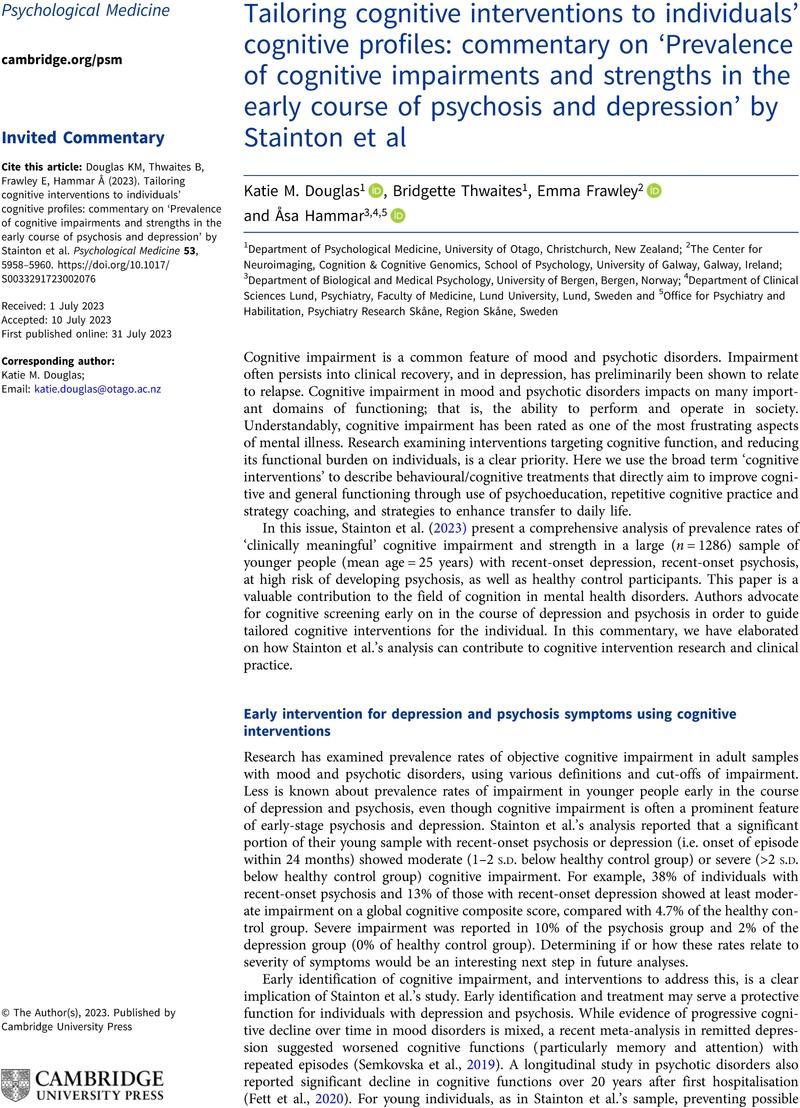No CrossRef data available.
Article contents
Tailoring cognitive interventions to individuals' cognitive profiles: commentary on ‘Prevalence of cognitive impairments and strengths in the early course of psychosis and depression’ by Stainton et al
Published online by Cambridge University Press: 31 July 2023
Abstract
An abstract is not available for this content so a preview has been provided. Please use the Get access link above for information on how to access this content.

- Type
- Invited Commentary
- Information
- Copyright
- Copyright © The Author(s), 2023. Published by Cambridge University Press
References
Bryce, S., Cheng, N., Dalton, A., Ojinnaka, A., Stainton, A., Zbukvic, I., … Allott, K. (2023). Cognitive health treatment priorities and preferences among young people with mental illness: The your mind, your choice survey. Early Intervention in Psychiatry. doi: 10.1111/eip.13436CrossRefGoogle ScholarPubMed
Douglas, K. M., Gallagher, P., Robinson, L. J., Carter, J. D., McIntosh, V. V., Frampton, C. M., … Porter, R. J. (2018). Prevalence of cognitive impairment in major depression and bipolar disorder. Bipolar Disorders, 20, 260–274. doi: 10.1111/bdi.12602CrossRefGoogle ScholarPubMed
Fett, A. J., Velthorst, E., Reichenberg, A., Ruggero, C. J., Callahan, J. L., Fochtmann, L. J., … Kotov, R. (2020). Long-term changes in cognitive functioning in individuals with psychotic disorders: Findings from the Suffolk County Mental Health Project. JAMA Psychiatry, 77(4), 387–396. doi: 10.1001/jamapsychiatry.2019.3993CrossRefGoogle ScholarPubMed
Jones, N. (2023). Cognitive challenges, cognitive remediation and lived experience. Paper presented at the Cognitive Remediation in Psychiatry, New York.Google Scholar
Semkovska, M., Quinlivan, L., O'Grady, T., Johnson, R., Collins, A., O'Connor, J., … Gload, T. (2019). Cognitive function following a major depressive episode: A systematic review and meta-analysis. The Lancet Psychiatry, 6(10), 851–861. doi: 10.1016/S2215-0366(19)30291-3CrossRefGoogle Scholar
Stainton, A., Chisholm, K., Griffiths, S., Kambeitz-Ilankovic, L., Wenzel, J., Bonivento, C., … Wood, S. (2023) Prevalence of cognitive impairments and strengths in the early course of psychosis and depression. Psychological Medicine, 1–13. doi: 10.1017/S0033291723001770Google ScholarPubMed
Steele, P., Cheng, N., Phillips, L. J., Bryce, S., Alvarez-Jimenez, M., & Allott, K. (2021). Cognitive strengths in first episode psychosis: A thematic analysis of clinicians’ perspectives. BMC Psychiatry, 21(1), 612. doi: 10.1186/s12888-021-03627-yCrossRefGoogle ScholarPubMed
Strawbridge, R., Tsapekos, D., Hodsoll, J., Mantingh, T., Yalin, N., McCrone, P., … Young, A. H. (2021). Cognitive remediation therapy for patients with bipolar disorder: A randomised proof-of-concept trial. Bipolar Disorders, 23(2), 196–208. doi: 10.1111/bdi.12968CrossRefGoogle ScholarPubMed
Tran, T., Milanovic, M., Holshausen, K., & Bowie, C. R. (2021). What is normal cognition in depression? Prevalence and functional correlates of normative versus idiographic cognitive impairment. Neuropsychology, 35(1), 33–41. doi: 10.1037/neu0000717CrossRefGoogle ScholarPubMed



